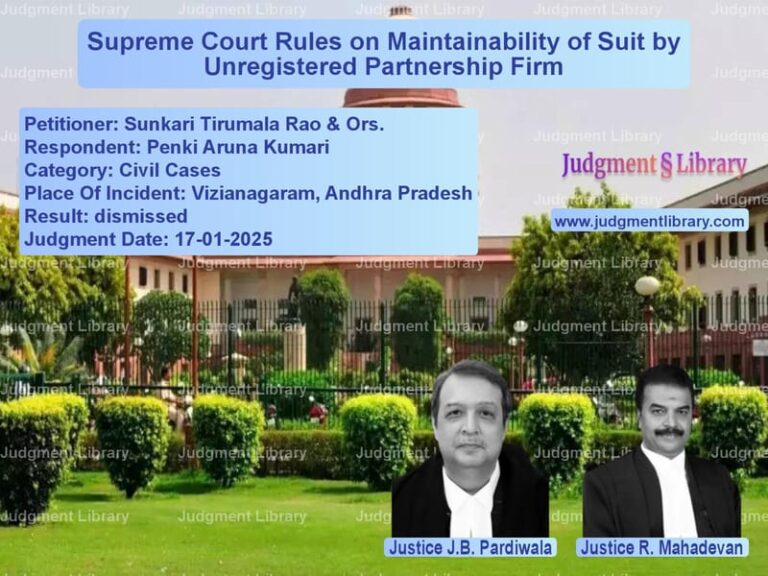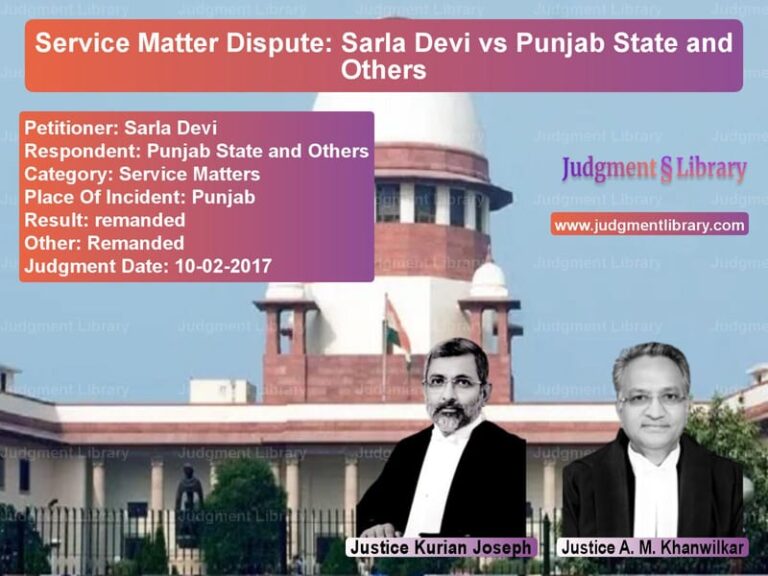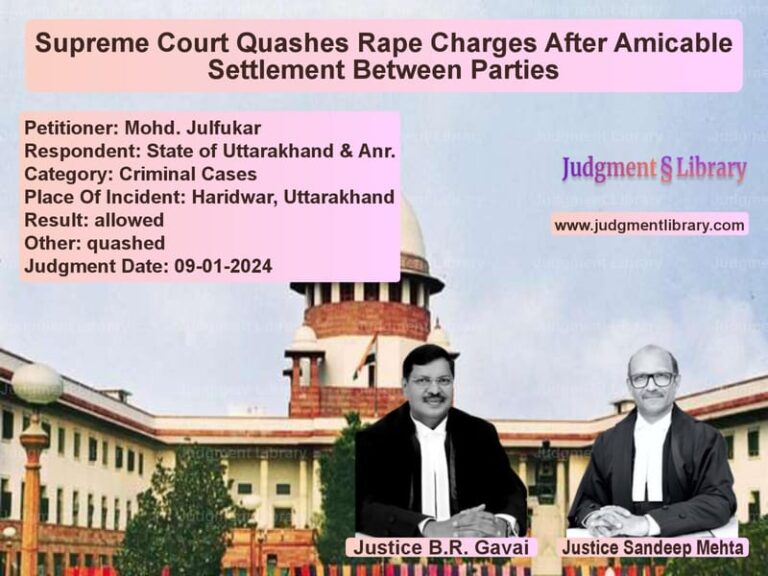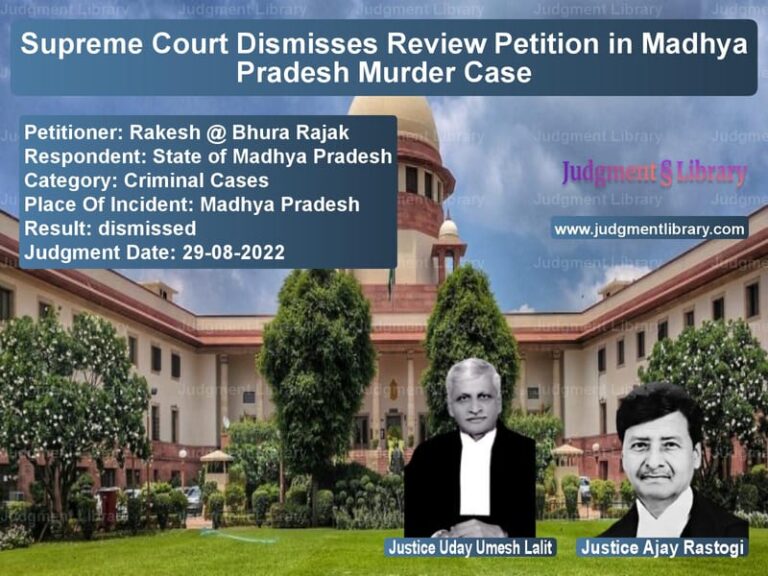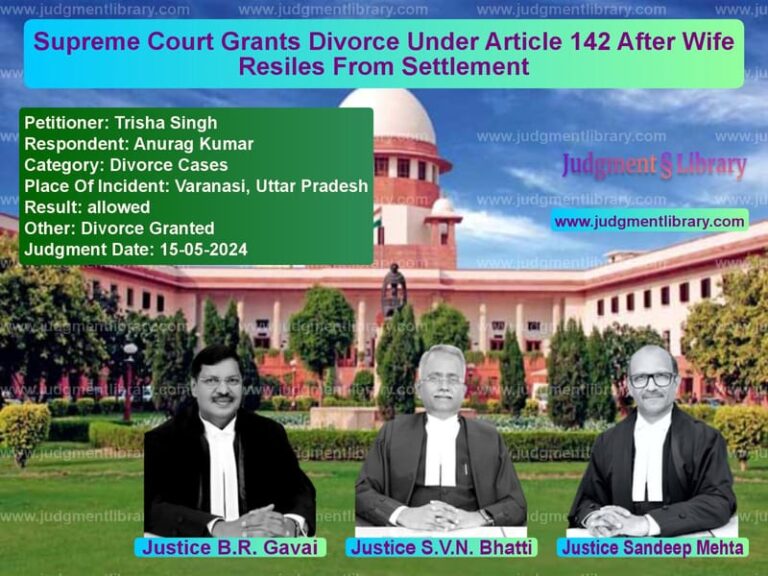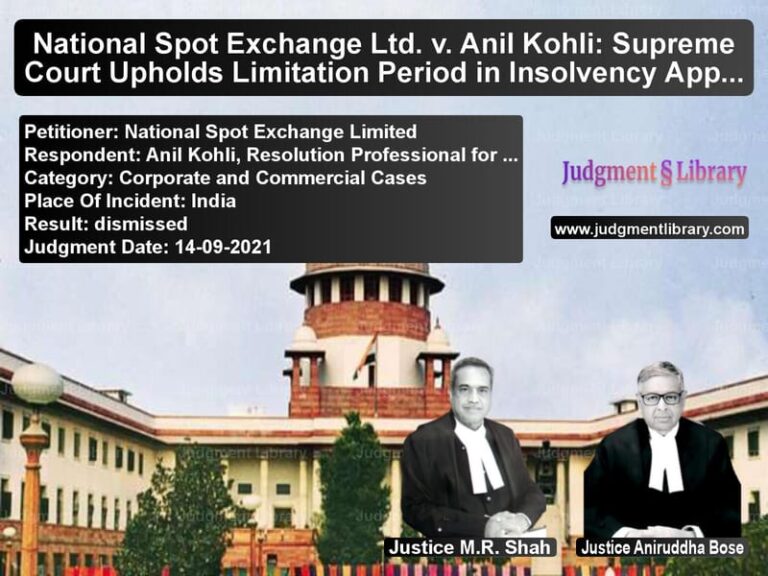Supreme Court Ruling on Partnership Dissolution and Business Asset Distribution
The Supreme Court of India recently delivered a significant judgment in M/S Crystal Transport Private Limited & Anr. vs. A Fathima Fareedunisa & Ors., addressing the complexities of partnership dissolution, business asset distribution, and the rights of partners in financial settlements. The ruling clarifies how courts should approach disputes arising from the dissolution of partnerships, especially when assets are transferred to third-party companies.
Background of the Case
The dispute emerged when the original plaintiff, A Fathima Fareedunisa, filed a lawsuit seeking:
- Dissolution of the partnership firm, Crystal Transport Service.
- Equitable distribution of the partnership assets among the partners.
- Accounting of profits, liabilities, and business transactions.
- An injunction to prevent the unauthorized disposal of firm property.
The firm was initially established in 1972–73 with four partners, each holding an equal stake. However, the plaintiff alleged that other partners had unilaterally transferred the firm’s assets to a private company, M/S Crystal Transport Private Limited, without her consent. She contended that the takeover deprived her of her rightful share of the business and its profits.
Legal Issues Raised
- Whether the partnership was dissolved legally.
- Whether the transfer of assets to a private company was valid.
- Whether the plaintiff had a rightful claim to the firm’s profits.
- The validity of the accounting methods used to settle liabilities and revenue distribution.
Arguments Presented
Petitioner’s Arguments
- The appellants (defendants) argued that the firm had been formed in 1971 under a fixed-term agreement and was not a partnership at will.
- They contended that the plaintiff had given implicit consent for the transfer of firm assets to a private company.
- The 1978 agreement authorized the company to take over the firm’s assets and liabilities in the ordinary course of business.
- The plaintiff’s demand for additional accounting and a share of business profits was unwarranted, as she had voluntarily exited the firm.
Respondent’s Arguments
- The plaintiff argued that the firm’s dissolution was illegal as she had never agreed to its termination.
- She denied any agreement to transfer firm assets to the private company.
- The plaintiff accused the other partners of misappropriating firm assets and profits without providing her due share.
- She argued that the accounting methodology used to assess her claim was flawed and did not reflect the firm’s true financial standing.
Supreme Court’s Analysis
1. Legality of the Dissolution
The Court held that, under the Indian Partnership Act, 1932, a partnership at will can only be dissolved with the consent of all partners. It ruled:
“The unilateral dissolution of the firm without the consent of all partners constitutes a violation of partnership principles.”
Since the firm’s dissolution had not followed due process, the Court found the takeover of assets by the private company to be illegitimate.
2. Validity of the Asset Transfer
The Supreme Court observed that transferring assets from a partnership firm to a third-party company required the explicit consent of all partners. The Court stated:
“Firm property cannot be unilaterally transferred to another entity unless all partners agree to the transaction and receive fair compensation.”
The transfer of assets was thus ruled as unauthorized and invalid.
3. Plaintiff’s Right to Profit Share
The Court clarified that a partner remains entitled to a fair share of profits even after dissolution until assets are formally settled. The ruling emphasized:
“Even in cases of dissolution, partners retain rights to their due share of profits until an equitable settlement is reached.”
The Court instructed that a fresh accounting process be conducted to accurately determine the plaintiff’s entitlement.
4. Examination of Accounting Methods
The Supreme Court found flaws in the financial assessments previously used to settle the dispute, indicating a need for improved evaluation. The Court directed:
“A forensic audit must be conducted to ascertain the financial standing of the firm, ensuring a just and fair division of assets.”
Final Judgment
- The Supreme Court overturned the final decree issued by the lower court.
- The case was remanded for fresh accounting and asset evaluation.
- The trial court was directed to appoint a new receiver to oversee firm assets.
- The Court mandated an independent forensic audit of the firm’s financial records.
- The plaintiff was awarded her rightful share of the firm’s profits, subject to final accounting.
Implications of the Judgment
- Enhanced Protections for Partners: This ruling ensures that no partner can be excluded from business settlements without consent.
- Restriction on Asset Transfers: Business assets cannot be transferred to third-party entities without unanimous partner approval.
- Fairer Accounting Standards: Courts must ensure accurate financial assessments before resolving partnership disputes.
- Judicial Oversight on Business Takeovers: This ruling emphasizes the need for careful judicial scrutiny in corporate takeovers involving partnership firms.
- Stronger Forensic Audits in Business Disputes: The Supreme Court has mandated forensic audits as a tool for ensuring transparency in financial settlements.
Conclusion
This Supreme Court decision sets a strong precedent for handling partnership dissolutions and business asset transfers. It reinforces the principle that all partners must have an equal say in business decisions and that financial settlements must be conducted fairly and transparently. By emphasizing forensic audits and independent asset evaluations, the ruling ensures greater accountability in partnership disputes, protecting the rights of all stakeholders involved.
Read also: https://judgmentlibrary.com/legal-implications-of-the-byjus-insolvency-case-a-supreme-court-review/
Petitioner Name: M/S Crystal Transport Private Limited & Anr..Respondent Name: A Fathima Fareedunisa & Ors..Judgment By: Justice D.Y. Chandrachud, Justice J.B. Pardiwala, Justice Manoj Misra.Place Of Incident: Pondicherry.Judgment Date: 08-11-2024.
Don’t miss out on the full details! Download the complete judgment in PDF format below and gain valuable insights instantly!
Download Judgment: ms-crystal-transpor-vs-a-fathima-fareedunis-supreme-court-of-india-judgment-dated-08-11-2024.pdf
Directly Download Judgment: Directly download this Judgment
See all petitions in Company Law
See all petitions in Corporate Governance
See all petitions in Shareholder Disputes
See all petitions in Bankruptcy and Insolvency
See all petitions in Judgment by Dhananjaya Y Chandrachud
See all petitions in Judgment by J.B. Pardiwala
See all petitions in Judgment by Manoj Misra
See all petitions in partially allowed
See all petitions in Remanded
See all petitions in supreme court of India judgments November 2024
See all petitions in 2024 judgments
See all posts in Corporate and Commercial Cases Category
See all allowed petitions in Corporate and Commercial Cases Category
See all Dismissed petitions in Corporate and Commercial Cases Category
See all partially allowed petitions in Corporate and Commercial Cases Category


